US-Asia Business
US-China Market Watch: Amazon China, Trade Talks, China Gaming
By Angela Bao

Your monthly roundup of the latest US-China business and industry news.
Amazon stops seller services in China
Amid an increasingly fraught Chinese e-commerce market, Amazon announced that it will no longer operate its third-party marketplace and will stop seller services on its Chinese website starting July 18.
Amazon has been talking with Kaola, the e-commerce subsidiary of Chinese gaming company NetEase, about merging its China business. The Wall Street Journal suggests that the partnership between Amazon and Kaola could give “leading global brands” confidence to operate on NetEase platforms, which weathered reports of selling counterfeit items.
When Amazon first entered China in 2004, it was the largest online vendor for books, music and videos; now, it operates mainly as a marketplace where Chinese consumers can obtain foreign products. In the fourth quarter of 2018, Amazon only made up 6 percent of market share in cross-border e-commerce, compared to Kaola’s 25 percent and Alibaba’s 32 percent.
Instead, Amazon is now focusing on promoting its cloud services in China. Amazon Web Services (AWS), the company’s cloud computing unit, opened a data center in Hong Kong, making that its eighth location in the Asia Pacific and China region. The new Hong Kong location would allow AWS to compete more directly with Alibaba, which currently comprises 43 percent of China’s cloud infrastructure services, compared to AWS’s 6 percent reported in the first half of 2018.
The U.S. raises tariffs on $200 billion worth of Chinese goods
After the latest round of U.S.-China trade talks, the U.S. trade delegation accused China of reneging on almost all trade commitments. President Trump subsequently raised tariffs on $200 billion worth of Chinese goods up to 25 percent. Trump also threatened to place tariffs of up to 25 percent on an additional $300 billion worth of Chinese imports, which includes everything from handbags and sneakers, to parts for rifles. The Office of the United States Trade Representatives received a list of the targeted products, which the public will be allowed to comment on. In retaliation, China increased its tariffs on $60 billion worth of American goods, such as alcohol and liquefied natural gas, from 10 percent to 20 or 25 percent. Despite the escalation of the trade war, Trump still claims that U.S.-China trade talks are going well and that this is just “a little squabble.”
Trump believes that the tariffs will shift production back to the United States, despite warnings from his top economists that tariffs would hurt both sides. Trump also stated he would take steps to support those hurt by China’s tariffs and pledged $15 billion in aid to American farmers. However, economists and industry organizations believe that these measures will only cause prices to increase for consumers.
China reveals new gaming regulations
China’s State Administration of Press and Publication has set new video game guidelines and regulations. Although China resumed approving new game licenses and monetization, they also introduced new limits on the number of games that will be allowed to market per year, as well as restrictions on video game content.
Gambling games like poker and mahjong will no longer be approved, along with some games that take inspiration from imperial China. Officials will also no longer allow any depiction of blood or corpses. TechCrunch reports that while larger companies should not be too affected, smaller publishers are likely to be wiped out from competition.
Vice Studios and Tencent sign deal
Vice Studios has signed a deal with Chinese video game giant Tencent’s streaming service, Tencent Video. Vice will produce an eight-part series that will explore “hype culture” around the world. The series is geared toward Chinese audiences, particularly Chinese youth, and will be hosted in Chinese.
Vice Studios launched their China strategy in 2010 and started producing streaming series specifically geared toward Chinese audiences, such as “Young Chinese” and “Trap in Southwest China,” the latter of which documents the rise of rap music in China. Both series have received tens of millions of views.
Huawei now world’s second-largest smartphone company
Despite being blacklisted in the United States, Huawei has now overtaken Apple to become the world’s second-largest smartphone maker. Bloomberg reports that Huawei’s shipments grew by 50 percent from the previous year, and it was the only company among the top four smartphone makers to “expand volumes” despite an overall market decline.
Huawei’s first quarter revenue was up 39 percent. The company says it signed 40 contracts for its 5G technology and has become the “dominant supplier” to many 5G networks, which is expected to roll out to many markets this year. Although the United States has campaigned for its allies to similarly ban Huawei tech, Bloomberg reports that nations that make up about 40 percent of the world’s gross domestic product are either embracing Huawei technology, or do not plan to fully ban it.
Additionally, Huawei is now the world’s fourth-largest spender on research and development, having spent $15.3 billion in 2018 (Amazon was the number one spender, at $28.8 billion). Comparatively, Apple spent $14.2 billion last year.
Sign up for the Reach Further Newsletter
We’ll keep you in the know about the latest US-Asia business news and trends.
Suscríbase al boletín Reach Further
Lo mantendremos informado sobre las últimas noticias y tendencias comerciales entre Estados Unidos y China.

